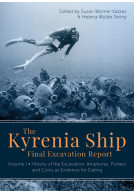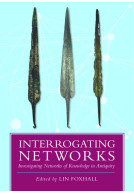The Kyrenia Ship Final Excavation Report, Volume I (Hardback)
History of the Excavation, Amphoras, Ceramics, Coins and Evidence for Dating
Imprint: Oxbow Books
Series: The Kyrenia Ship Final Excavation Report
Pages: 424
Illustrations: b/w and colour + additional folder of plans
ISBN: 9781785707520
Published: 15th October 2022
Script Academic & Professional
(click here for international delivery rates)
Need a currency converter? Check XE.com for live rates
The Kyrenia Ship, a Greek merchantman built around 315 BC, which sank off the north coast of Cyprus was excavated between 1968 and 1972 under the direction of Michael L. Katzev of the University of Pennsylvania and Oberlin College. The importance of this ship lies in the exceptionally well-preserved hull that provided new insights into ancient shipbuilding, as well as the cargo it carried. The hold was stacked with transport amphoras of various types made on Rhodes, with a few examples from Samos, Kos, Knidos and Cyprus (?), supplemented by a consignment of millstones, iron billets and almonds.
The cabin pottery from Rhodes also suggests this was the vessel’s home port, a conclusion supported by most of the scientific ceramic analyses. Its trade route included Rhodes, Cyprus and the Levant with perhaps Egypt as a final destination.
This volume provides a detailed history of the excavation followed by definitive studies of the amphora cargo and the pottery associated with shipboard life. Some of the amphora stamps suggest that the ship sank between 294 and 291 BC, dates corroborated by the cabin wares. The repetition of four drinking cups (kantharoi), oil containers (gutti), wine measures (olpai), as well as bowls and saucers, suggests that the ship was sailed by a crew of four. Seven bronze coins were recovered, five minted in the name of Alexander the Great and one well-known type of Ptolemy I produced only on Cyprus.
"This is the much-anticipated first volume in a series of three, presenting the results of the excavation of the Kyrenia ship. The effort invested by the editors deserves appreciation and admiration, and there is great expectation for the other volumes. It should serve as a textbook for those who analyse and interpret the many aspects of amphora cargoes and shipboard life of all periods, for scholars of maritime trade in Antiquity, and of course for all who are curious about revealing the secrets of this fascinating shipwreck."
International Journal of Nautical Archaeology - June 2024
About Susan Womer Katzev
Susan Womer Katzev trained as a sculptor. She worked as an artist on Roman and Early Byzantine shipwrecks at Yassi Ada, Turkey and then served as draughtsperson photographer, and director and writer for a film documenting the Kyrenia Ship excavations of Michael L. Katzev. Since Michael’s death in 2001 she has been working to complete the series of publications on the Kyrenia Ship.















